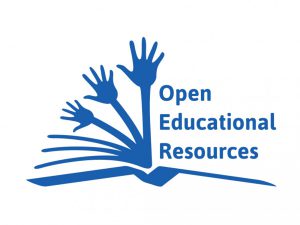
Last Thursday evening we held the first Open Pedagogy event of the semester, Open Educational Resources at City Tech. The event centered around presentations of self-developed OERs from three of CityTech’s OER Fellows, Ari Maller, David Lee, Sue Brandt, and Andrew Parker, Opening Gateways Co-Director of OER Development. The presentations sparked a lively conversation about the about the joys and challenges OERs present, and the potential they hold for our classrooms here at CityTech.
To recap:
Assistant Professor and City Tech librarian Cailean Cooney opened the event by contrasting open educational resources (OER) with the average amount a college student spends on textbooks a year ($1,200!). As many attendees concurred, textbook fees often prevent students from completing course readings or assignments, or present serious obstacles to doing so. OERs, which are free and openly licensed (public domain, Creative Commons) educational materials that can be used for teaching – as well as learning, research and other purposes – help students circumvent these prohibitive costs when accessing course material. Faculty noted that when they used OERs, as compared to traditional textbooks, students were able to access materials and complete courses more regularly. Presenters also commented on and shared how OERs allowed them to include more interactive elements into their class, including movie and audio clips, as well as allowed them more flexibility than a traditional textbook in terms of crafting the content for their course. Relatedly, Sue Brandt discussed how her OER allowed her to keep course content current in a way that traditional textbooks could not, David Lee discussed using learning management systems in tandem with the OpenLab, while Ari Maller and Andrew Parker highlighted the flexibility of updating assignments year to year to avoid cheating.
The discussion also highlighted OER-related anxieties and challenges. In particular, navigating licensure agreements and WordPress as a technological tool were of utmost of concern. Presenters shared their insights on navigating these domains, while the OpenLab Team chimed in to ensure the group that we are here to answer questions such as these through our workshops, office hours and email support.
Beyond the content of the presentations, OpenLab Community Facilitator Andy McKinney initiated a discussion about the potential for synergies between open pedagogy and OERs with respect to the potential for student-professor collaborations in the creation of OERs. For example, by building a shared resource like a glossary or even a set of test review questions, faculty can use open pedagogy techniques to collaborate with students to build OERs that have value beyond that particular class. This elicited much interest from the group and is something we’re looking forward to discussing more in the future.
All in all, this event was a tremendous success! Thank you to everyone who participated!
We look forward to seeing you at our next Open Pedagogy event with Writing Across the Curriculum (WAC) on November 3rd, 5:30-7:00pm in the Faculty Commons (N227). If you haven’t already, don’t forget to “join” Open Pedagogy on the OpenLab to stay in the loop about upcoming events and discussions about open digital pedagogy at City TEch.
For more reading on OERs:
- Check out City Tech Library’s resource guide on OERs
- “What Do We Mean by Open Education?” (January 16, 2015). Audrey Watters. Hack Education: The History of the Future of Education Technology.
- “Pedagogy, Technology, and the Example of Open Educational Resources.” (November 9, 2015). Robin DeRosa and Scott Robinson. Educause Review.
- “Open Pedagogy in Biology and Political Science.” (June 14, 2016), Cailean Cooney. Open Pedaogy.
- “Into the Open” (August 5, 2016). Karen Cangiolosi, Professor of Biology, Keene State College
Or Become an OER Fellow! The call for Spring 2017 fellows will go out October 17, 2016.




3 thoughts on “Recap: Open Educational Resources at City Tech”